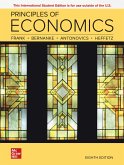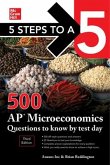Principles of Microeconomics focuses on seven core principles to produce economic naturalists through active learning. By eliminating overwhelming detail and focusing on core principles, students from all backgrounds are able to gain a deeper understanding of economics. Focused on helping students become "economic naturalists," people who employ basic economic principles to understand and explain what they observe in the world around them. COVID-19 pandemic content, analysis, and examples further engage students. With engaging questions, explanations, exercises and videos, the authors help students relate economic principles to a host of everyday experiences such as going to the ATM or purchasing airline tickets. Throughout this process, the authors encourage students to become "economic naturalists." Author developed Learning Glass concept overview videos and Worked Problem videos give students an overview of challenging and important concepts. With new videos and engagement tools in Connect, like Application-Based Activities, alongside SmartBook's adaptive reading experience, the 8th edition enables instructors to spend class time engaging, facilitating, and answering questions instead of lecturing on the basics.








